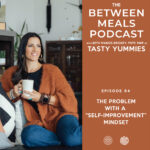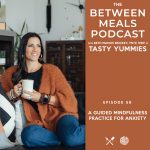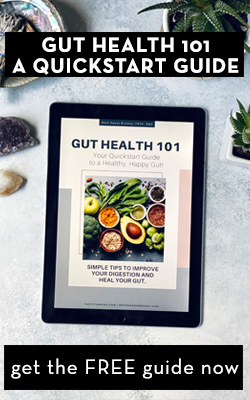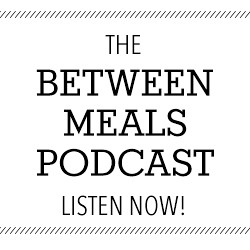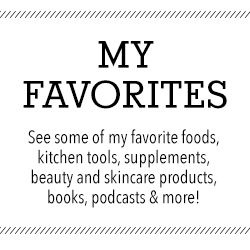A healthy body is dependent on a strong immune system. Rather than just strengthening our immune system we want to train our immune system to do it’s job correctly. Today I am sharing just some of my favorite natural tips for supporting and building a strong immune system that have worked for me. Here are 11 Natural Ways to Boost Your Immune System…
11 Natural Tips to Boost Your Immune System
Simple, holistic tips to fight illness and strengthen your immunity PLUS what you can do if you do get sick, to fight it quickly.
Go With Your Gut
I can tell you from personal experience that the very best way to ward off chronic illness, colds, flus, infections, allergies, food sensitivities and controlling / avoiding autoimmune disease is to heal and strengthen the gut! With 70-80% of our immune system’s cells occupying our gut, this is home base for our vitality and wellness. Our gut bacteria helps the immune system’s T cells develop—teaching them the difference between a foreign substance and the body’s own tissues. Without these important immune soldiers doing their job to protect us, the nasties get in, they slip by the troops, invade, wage war, take over and it’s not fun!
With years of comprised digestion, intestinal bacterial overgrowth and finally being diagnosed with a parasite, I personally spent a solid decade to 15 years, getting terrible sinus infections, several times a year, every year, most times it then eventually evolved into bronchitis and upper respiratory infections. I got every single strain of every cold, flu and stomach bug that passed through town – I even battled the Swine Flu when that was a thing. On top of all of that, I suffered for many, many years with a variety of environmental allergies – ALL of this stopped when I finally healed my gut and prioritized proper digestion. It’s magical really. But, it’s not. It’s simple.
As you’ll hear echoed many times throughout this article, and if you spend more than about 5 minutes chatting with me at any given time, our gut is vital to our immune health and it’s the control center for our bodies to decide what is friend and what is foe. I highly encourage you to prioritize optimizing your gut, both for the cold and flu season ahead, as well as the future of your overall health and wellness. If you want to learn more about how to heal your gut – GRAB THE FREE GUT HEALTH 101 GUIDE BOOK
Along with tips for strengthening and healing your gut, here are some tips to Naturally Boost Your Immune System:
-
Avoid Sugar.
Regular consumption of sugar can weaken your immune system enough to impair it’s ability to fight off infections. Sugar is a major disruptor and destroyer of our immune system, it also becomes food for the nasty bugs that make us sick. Flooding the blood with sugar can temporarily impair the functions of white blood cells even in the healthiest of people.1http://www.progressivehealth.com/does-eating-sugar-increase-your-risk-of-influenza.htmAdditionally, Vitamin C (a powerful ally for immune function as it is used by the cells of your immune system to carry out their attacks on pathogenic microbes) and glucose have similar molecular structures and chemical makeups. Because refined dietary sugars lack vitamins and minerals, they naturally draw upon the body’s micronutrient stores in order to be successfully metabolized by the body. What mediates the entry of Vitamin C into white blood cells is the same thing that mediates the entry of glucose. As such, both molecules end up competing against one another upon entering the cells. Thus, the more sugar that becomes available for uptake in the body, the less Vitamin C that is allowed into the white blood cells. 2https://www.ncbi.nlm.nih.gov/pubmed/15578707
-
Eat a Nutrient Dense Whole Food Diet and Stock Up on Veggies, Especially the Fiber-Rich Ones.
Vegetables are a really great source of prebiotic fiber, which feeds the healthy bacteria in our intestines, which is where 70-80% of our immune system actually lives. (Garlic, onions, asparagus, avocados and leeks are all wonderful sources of prebiotic fiber) Additionally, a nutrient-dense whole food diet full of a variety of vegetables, fruit and quality animals fats and proteins will be abundant in a variety of immune-supporting vitamins, like Vitamins A, B6 (+ other B vitamins), C, D and E along with important minerals like selenium, zinc, iron, copper – along with many others. Unlike many synthetic supplements boasting high levels of nutrients, mother nature generally creates whole foods to perfectly contain ALL the necessary cofactors needed to help us adequately assimilate these whole food nutrients for maximum benefits. Always opt for wholes food first, instead of or in addition to supplementation. (I personally also suggest experimenting with eliminating common gut-irritating foods, like grains/gluten, dairy, legumes, etc while you work to heal your gut)
-
Eat Mindfully and Prioritize Good Digestion.
By prioritizing good digestion you are ensuring that your gut is adequately doing it’s job in assimilating all the appropriate nutrients from your food necessary for promoting good immune function. A good working digestive system means a stomach that is producing ample amounts of hydrochloric acid, which this one aspect alone plays a crucial role in protecting the body from foreign invaders. I cannot stress enough just how dependent a solid working immune system is on healthy, properly functioning digestive system! Check out my 5-part, in-depth series Digestion 101 to learn exactly how you optimize your digestion and follow these 5 Super Simple Mealtime Tips to Improve Digestion. You may also want to consider experimenting with fasting, which has shown to provide great benefits to immune functions, including regenerating damaged cells (look for a more in-depth post on this soon).
-
Get Lots of Sleep.
Sleep is crucial to all ongoing, vital processes, but it’s especially important when we are healing and warding off the nasties. Our body repairs and rebuilds itself while we sleep. The more fatigued we are the more susceptible we are to illness. Aim for 7-9 hours of sleep a night to avoid fatigue and immune suppression. 3https://www.ncbi.nlm.nih.gov/pmc/articles/PMC3256323/
-
Catch Some Rays and Get Your D.
Vitamin D acts more as a pro-hormone than a vitamin and effects hormone balance and immune regulation of the body. Vitamin D is involved in making hundreds of enzymes and proteins, crucial for preserving health and preventing disease. It has the ability to interact and affect more than 2,000 genes in the body. It enhances muscle strength and builds bone. It has anti-inflammatory effects and bolsters the immune system. It helps the action of insulin and has anti-cancer activity. 4https://www.bewell.com/blog/vitamin-d-faq/ The best way to get more Vitamin D is through safe sun exposure in small, controlled increments of time. The key, however,cis balance, as over exposure to the sun, as we all know, can obviously have detrimental consequences to our health. Obviously this can be hard in the winter months, depending on where you are located. But know, that often just 20 minutes a day, will do ya.
Vitamin D is also present in various foods, like cod liver oil, sardines, salmon and mackerel to name a few, but with only about 10% of our vitamin D requirements coming from food, it’s really difficult to get the full necessary amounts strictly from food. Supplementation is absolutely possible, but can get a little more tricky. It’s important to supplement with D3 not D2, however there are many, many other co-factors to consider with supplementation of vitamin D (vitamins A and K, calcium, magnesium, phosphorus and zinc, just to name a few) and you also want to be careful not too over supplement with D. Best to work with your healthcare practitioner and utilize lab testing to check blood levels, so you can custom tailor your dosage to your individualized needs. Read more about vitamin D, sun exposure and supplementation here, here and here.
-
Minimize Stress and Find Time for Self-Care.
Stress has so many faces. Of course work and life stress of the common variety are what we think of when we think of stress traditionally, but too, the body also perceives food intolerances and allergies as stressors on the body, along with exposure to toxins and other environmental factors. Excessive and obsessive exercise can also cause stress in the body. Whenever we are stressed, no matter what the cause, we are engaging the sympathetic nervous system aka Fight or Flight Mode, and our body then releases cortisol, a powerful anti-inflammatory that has value to short-term survival, which is what our bodies perceives to be necessary whenever we are stressed.
Excessive production of cortisol however, can leave our adrenals depleted and leave us in a weakened state. Cortisol, the active stress hormone, clamps down immune function (along with the digestive and reproductive systems) by shutting it down, this is to prioritize stress management and keeping us alive and safe. 5https://www.ncbi.nlm.nih.gov/pmc/articles/PMC1361287/ Cortisol also lowers an important antibody called secretory IgA, which lines the respiratory tract and gut and is our first line of defense against invading pathogens. Incorporating stress management techniques like deep breathing, meditation, calming baths, exercise, self-care practices and anything else that allows you to relax can all be helpful in mitigating the damaging effects of stress, especially on our immune system. Here are my 10 simple ways to practice self-care, guaranteed to reduce stress.
-
Get Ample Quality, Healthy Fats.
Healthy fatty acids play an important role in the inflammatory process in the body. While inflammation often gets a bad wrap, it’s important to note that it’s the balance of the body’s ability to inflame and anti-inflame that’s of most importance. Inflammation, when doing it’s job correctly, serves an important role in our bodies, especially within the immune system. The purpose of inflammation and why we even have the ability to do it at all, is healing. The immune system creates heat to kill infection. It creates swelling to contain said infection, and then deliver healing nutrients to the area. The extra fluids also get released (pus, mucus, ahem BOOOOGERS and snots – OH MY) to eliminate the dead organisms. The pain and immobility that results with acute with inflammation, this forces rest, so the body can slow down enough to adequately heal.
Quality fats are precursors to prostaglandins, which are the hormone-like substances that allow the body to inflame and anti-inflame, as needed. And once again, digestion HAS to be working properly so that our body can properly emulsify fat to assimilate and utilize it, as needed. It’s the balance of these two abilities that keeps us fighting disease and illness. Read more here about the importance of fats. It’s really important to note that by incorporating a variety of healthy fats, we are fueling our body’s ability to do it’s job. If an excess of bad fats and oils are consumed on a regular basis, this triggers constant inflammation and disease WILL prevail.
A note on why we want to reduce excess inflammation: it is the long term, chronic and constant inflammation and imbalance of inflamed vs anti-inflamed that is pathological and related to most chronic illnesses, like cancer, diabetes, cardiovascular diseases, autoimmune diseases, etc.
-
Consume Bone Broth.
Bone broth is rich in so many key nutrients responsible for boosting your immune function and helpful in healing your gut, which as we already discussed is where a good majority of our immune system lives. Bone broth is rich in gelatin, collagen, and amino acids which tend to the gut, improve wound healing, and help support the health of individual immune cells such as lymphocytes. Make your own bone broth from high-quality grass-fed bones to reap the full potential nutritional and healing benefits. Learn how-to make bone broth and all about it’s many benefits here.
-
Move That Bod.
Movement and adequate daily exercise is an important factor in building a strong and healthy immune system along with improved cardiovascular health, moods and weight management. While it’s not fully understood why, it may be that exercise contributes by promoting good circulation, which allows the cells and substances of the immune system to move through the body freely and do their job efficiently along with improving our antibody response to infection. Exercise can also boost your body’s feel-good chemicals that will help you sleep better. Which is also great for the immune system, as you read above. Go for a walk, lift weights at the gym, do yoga, run, dance – find something that you love that can be part of your regular routine. If you can feel that your immune system is working to fight something off, be sure to reduce your output and opt for exercise / movement that is more restorative and not stressful to the body.
-
Include Probiotics.
Preferably from probiotic-rich fermented foods or a quality probiotic supplement that has a broad array of bacteria species. While I may sound like a broken record, with up to 80% of our immune system living in our gut, anything we can do to support it should be done, always. Making sure the good bacteria beats out the bad is of high importance, especially when we are hoping to boost our immune function. Besides feeding the good guys with quality prebiotic fiber, as mentioned above, we can also introduce more of those healthy bacteria warriors with quality fermented foods like sauerkraut, kvass, kefir, yogurt, preserved lemons, kimchi and more.
Try to include quality fermented foods at least once a day and if you can’t, opt then for a high quality probiotic supplement you can trust. There are many strains of probiotic bacteria out there and while our individualistic needs and deficiencies can vary from person to person, the best place to start when taking a probiotic supplement is to look for Lactobacillus and Bifidobacterium, two of the most important strains of bacteria that populate our gut from birth have been shown to positively affect our immune health. I always suggest looking for a probiotic that has at least 30 to 50 billion colonies and at least eight strains of bacteria. Double this dose if you’re coming down with a cold or have to take antibiotics. You may also want to investigate a spore-based probiotic, which help improve your intestinal barrier function, which also influences your immune function.
-
Consider Incorporating Immune Supporting / Boosting and Anti-Viral Herbs and other Supplements:
- Elderberry*
- Ginger 6http://articles.mercola.com/sites/articles/archive/2014/06/30/ginger-health-benefits.aspx – even just a simple mug of fresh ginger tea made from fresh ginger and hot water a few times a day, will do ya.
- Turmeric – my golden milk or golden bone broth latte are both great options
- Echinachea*7https://www.hindawi.com/journals/ecam/2012/841315/ 8https://www.ncbi.nlm.nih.gov/pubmed/12622467
- Oil of Oregano9https://www.ncbi.nlm.nih.gov/pubmed/25763467 10https://www.ncbi.nlm.nih.gov/pubmed/19783523
- Garlic 11https://www.ncbi.nlm.nih.gov/pubmed/10594976 12https://www.sciencedaily.com/releases/2012/05/120501134203.htm – load up those soups
- Colloidol Silver 13https://www.ncbi.nlm.nih.gov/pubmed/23017226
- Astralagus* 14https://www.ncbi.nlm.nih.gov/pubmed/15035888
- Cordyceps*15https://www.ncbi.nlm.nih.gov/pmc/articles/PMC1193547/
- Rhodiola*16http://cms.herbalgram.org/herbalgram/issue56/article2333.html
For more information on building your immunity and protecting yourself with broad-spectrum herbal treatments, this book Herbal Antivirals: Natural Remedies for Emerging & Resistant Viral Infections is a really great resource.
Always check for contraindications or allergies when starting a new herbal or supplement remedy of any kind and if you begin to feel worse, or get any new symptoms, it’s best to stop use and check with a doctor before continuing. Beyond garlic, ginger and turmeric, it is not advised to consume immune boosting/supportive botanicals over long extended periods of time, without working with a professional.
* Whenever incorporating any “immune boosting” botanicals, herbs and supplements, people with autoimmune diseases that involve an overactive immune response should exercise caution and speak with their health-care practitioner before using them.
Additional Immune Boosting Tips:
- Don’t smoke.
- Only consume alcohol in moderation.
- Avoid artificial sweeteners.
- Avoid vegetable oils.
- Reduce your exposure to toxins, destructive and unhealthy habits and any other stressors to the body.
- Wash your hands, especially when you are out and about in the world during cold and flu season.
SO, YOU GOT SICK – NOW WHAT DO YOU DO?
If you do catch a little something this winter, don’t stress, if you’re immune system is in tip top shape, you should fight it super quickly and be back to yourself in no time. In fact, getting minor illnesses are a sign things are working. The symptoms you experience when exposed to illness and bugs, this is a sign your immune system is doing it’s job and working. It’s all about how quick and effective your immune system is at fighting the sickness. Follow the above rules and really put a strong focus on lots of rest, de-stressing, staying hydrated and remember, please try to stay at home and at the very least cover your mouth if you are around other people – both of which are quite thoughtful in avoiding getting others sick! When it concerns supplements for acute care with the purpose of shortening the duration of the illness or upon exposure to someone ill, I personally put a strong focus on zinc (in the form of zinc acetate lozenges), quality vitamin C and elderberry syrup – this routine always works in allowing me to fight illness much, much quicker, if it ever even fully takes hold! I also recently added this immune supporting supplement to my repertoire.
If you are fighting a stomach flu or possible exposure to pathogens from food, I encourage taking charcoal supplements (2 capsules every few hours upon first symptoms), stay hydrated with plenty of clear liquids, such as pure filtered water and broth, you can drink ginger tea to ease nausea and be sure replenish electrolytes and increase your probiotics to restore what was lost.
My final recommendation would be, if you can manage, it’s best to avoid over-the-counter symptom suppressant medications, AKA meds designed for cold and flu symptoms, anti-diarrheal or anti-vomiting, etc. When the immune system detects a foreign invader, it is designed to remove it. That’s it’s job. Sneezing, coughing, runny nose, vomit, diarrhea, all serve very important purposes in our healing. Taking drugs that suppress the removal of the invader(s) and instead trapping it inside your body? Doesn’t sound so smart, does it? Obviously there are times that life must continue on and meds are necessary to being able to function – but definitely choose your battles!
DISCLAIMER: This post is meant to inform and educate—it is not a replacement for medical advice and should not be construed as such.
References
| 1. | ↑ | http://www.progressivehealth.com/does-eating-sugar-increase-your-risk-of-influenza.htm |
| 2. | ↑ | https://www.ncbi.nlm.nih.gov/pubmed/15578707 |
| 3. | ↑ | https://www.ncbi.nlm.nih.gov/pmc/articles/PMC3256323/ |
| 4. | ↑ | https://www.bewell.com/blog/vitamin-d-faq/ |
| 5. | ↑ | https://www.ncbi.nlm.nih.gov/pmc/articles/PMC1361287/ |
| 6. | ↑ | http://articles.mercola.com/sites/articles/archive/2014/06/30/ginger-health-benefits.aspx |
| 7. | ↑ | https://www.hindawi.com/journals/ecam/2012/841315/ |
| 8. | ↑ | https://www.ncbi.nlm.nih.gov/pubmed/12622467 |
| 9. | ↑ | https://www.ncbi.nlm.nih.gov/pubmed/25763467 |
| 10. | ↑ | https://www.ncbi.nlm.nih.gov/pubmed/19783523 |
| 11. | ↑ | https://www.ncbi.nlm.nih.gov/pubmed/10594976 |
| 12. | ↑ | https://www.sciencedaily.com/releases/2012/05/120501134203.htm |
| 13. | ↑ | https://www.ncbi.nlm.nih.gov/pubmed/23017226 |
| 14. | ↑ | https://www.ncbi.nlm.nih.gov/pubmed/15035888 |
| 15. | ↑ | https://www.ncbi.nlm.nih.gov/pmc/articles/PMC1193547/ |
| 16. | ↑ | http://cms.herbalgram.org/herbalgram/issue56/article2333.html |




